6 facts about Juvenile Idiopathic Arthritis

When we hear the word arthritis, many of us think of adult or elderly patients with joint pain and stiffness. But did you know that arthritis is a condition that affects about one in 1,000 children and teenagers in Canada—a total of 10,000 young people?
Children and teenagers get a type of arthritis called Juvenile Idiopathic Arthritis (JIA). "Juvenile" means young (16 years of age or younger) and "idiopathic" means that the cause is not known. JIA was previously called Juvenile Rheumatoid Arthritis (JRA). Arthritis is an inflammation of the synovial membrane which lines joints like the knees or ankles. When it becomes inflamed, fluid is produced. The joints can become stiff, swollen, painful, and warm to the touch. Over time, inflammation in a joint can damage the cartilage and bone.
Here are six other interesting facts about JIA that may surprise you:
1. The exact cause of JIA is not known.
What is known about the condition is that the immune system doesn’t work normally. The immune system's job is to fight off germs and disease. However, in patients with JIA, the immune system attacks healthy joints, causing inflammation.
2. JIA affects every child differently, and symptoms can vary on a daily basis even in the same child.
Children with JIA may have pain and stiffness that can change from one day to the next or from morning to afternoon. Mornings are usually more difficult. When the condition becomes more active and the symptoms worsen, it's known as a "flare" or a "flare-up”.
If the arthritis is not treated, it can lead to joint damage, muscle tightening, joint misalignment, and a longer limb or shorter digit (fingers or toes) due to its effect on the growth of the bones.
3. There are many different types of JIA.
There are seven different types of JIA that affect children and teenagers under 16 years of age, including:
- Oligoarthritis (two different types) – arthritis affecting 1 to 4 joints
- Polyarthritis (two different types) – arthritis affecting more than 5 joints
- Systemic arthritis – arthritis accompanied by fever and rash
- Enthesitis-related arthritis – arthritis and inflammation of tendon insertions
- Psoriatic arthritis – arthritis accompanied by psoriasis
4. Although JIA mostly affects the joints and surrounding tissues, it can also affect other organs, like the eyes, skin, liver, heart, and lungs.
Children diagnosed with systemic arthritis, which is the most severe form of JIA, can have inflammation of the skin, liver, heart and lungs.
The eyes can also be affected in many different types of JIA and in up to 20% of children with oligoarthritis. All children with JIA need to undergo regular visits to the eye doctor because the eye disease associated with this condition does not have any symptoms. If not picked up and treated properly, it can have severe consequences.
5. There are some types of arthritis in children and teenagers that do not occur in adults.
The inverse of this statement is also true: there are types of arthritis in adults such as rheumatoid arthritis or osteoarthritis that are rare in children. While it is possible for children to be diagnosed with these, it is less common.
6. JIA is a chronic condition, meaning it can last for months and years; or a lifetime.
The disease is often controlled with medications. Sometimes when the disease is quiet, these medications can be stopped, which is referred to as a remission. Remission may last for months, years, or a person's lifetime. In fact, many teens with JIA can enter full remission with little or no permanent joint damage.
Learn more about juvenile idiopathic arthritis by visiting arthritis.ca.
References
- http://www.aboutkidshealth.ca/En/ResourceCentres/JuvenileIdiopathicArthritis/AboutJIA/Pages/default.aspx
- http://www.kidsgetarthritistoo.org/about-ja/the-basics/what-is-juvenile-arthritis.php
- http://kidshealth.org/teen/diseases_conditions/bones/juv_rheumatoid_arthritis.html#
- http://www.arthritis.ca/page.aspx?pid=936


